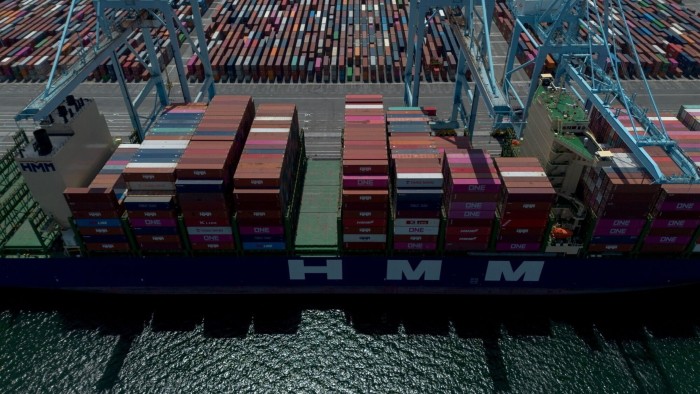This article is an on-site version of our FirstFT newsletter. Subscribers can sign up to our Asia, Europe/Africa or Americas edition to get the newsletter delivered every weekday morning. Explore all of our newsletters here
Good morning and welcome to FirstFT Asia. In today’s newsletter:
-
China seeks to reassure the public about the economy
-
Why Trump can’t build iPhones in the US
-
An op-ed on the Indus Waters Treaty and Indian security
We start in Beijing, China’s top economic officials yesterday used a press conference to reassure the public about the state of the economy amid a trade war with the US. Here’s more on what they said.
Projecting confidence: Zhao Chenxin, vice chair of the National Development and Reform Commission, China’s state planner, said the country could do without American farm and energy imports. US agricultural imports were “primarily for feed grains, which were highly substitutable”, Zhao said, and noted there would be limited impact on China’s energy supplies if companies stopped importing American oil, natural gas and coal.
With US-China bilateral tariffs at more than 100 per cent, trade between the two economic superpowers has begun to fall, causing Chinese factories to begin furloughing workers. But Zhao maintained that Beijing was “fully confident” of hitting the country’s 5 per cent growth target for the year, even as he admitted “external shocks were increasing”.
Trade war impact: The loss of the Chinese market would be a substantial hit for US farmers, who shipped roughly $33bn of agricultural goods to the country in 2023. The US also sent about $15bn of oil, gas and coal to China. There is rising desire in the Trump administration for talks with Beijing, but China has shown little appetite for negotiations and repeatedly blasted Washington’s claims of ongoing discussions as false. Beijing last week indicated that the US should cancel its tariffs as a starting point for trade talks. Read the full story.
-
China stockpiles oil: Chinese oil traders are setting aside concerns over the long-term economic damage of a US trade war as they seek to profit from one of the short-term consequences: lower crude prices.
-
Chinese clean tech exports surge: China has rapidly scaled up sales of solar panels, batteries and other green energy technologies to emerging markets well ahead of the US tariff fight, the latest data shows.
Here’s what else we’re keeping tabs on today:
-
Japan-Philippines relations: Japanese Prime Minister Shigeru Ishiba begins a visit to Manila, where he will meet his Philippine counterpart Ferdinand Marcos Jr.
-
Canadian election results: The first polls close in the coming hours. The vote, which has been overshadowed by Trump’s attacks on the country’s sovereignty, has pitted Prime Minister Mark Carney against Conservative party leader Pierre Poilievre.
-
Earnings season: HSBC, China Construction Bank and the Industrial & Commercial Bank of China report earnings.
Thinking about your next trip? Join the FT and Nikkei Inc. as we explore why Japan is topping global travel lists and how you can make the most of your next visit. Register for free.
Five more top stories
1. Shares in a swath of companies surged in Tokyo yesterday after a $42bn plan to take car parts maker Toyota Industries private triggered hopes of a wider overhaul of Japan’s corporate landscape. Investors are placing bets on subsidiaries and affiliates that they think might also come under pressure to change their ownership relationship.
2. Pirelli’s board has voted to strip Chinese conglomerate Sinochem, its single largest shareholder, of control over the Italian tyre company amid clashes over its governance. The Italian and Chinese board members have been at odds for some time, and the tensions were further heightened by Trump’s trade war with China and its implications for Pirelli’s American expansion. Here are more details.
3. European and Ukrainian officials fear Trump is on the brink of walking away from peace negotiations with Kyiv and Moscow, potentially using minor progress in talks as an “excuse” to say his job is done, according to people briefed on the discussions. Officials are convinced Trump is ready to seize any kind of breakthrough this week, which marks his first 100 days in office — even if it falls short of a long-term solution.
4. A mystery power outage hit Spain and Portugal yesterday, paralysing transport networks and disrupting mobile communications. The Spanish government declared a state of emergency as large areas faced a night without electricity. Here’s more on the havoc caused by the massive outage.
5. The acting chief executive of Saudi Arabia’s Neom has in recent weeks launched a “comprehensive review” of the scope and priority of projects within Crown Prince Mohammed bin Salman’s flagship scheme, two people familiar with the matter said. Aiman al-Mudaifer was appointed last year to lead the $500bn mega project following increasing scrutiny of the futuristic plan.
Visual story
The Trump administration wants Apple to manufacture its iPhones in the US instead of China, where most of them are currently made. But our latest visual story shows how the components that power it make this highly impractical.
We’re also reading . . .
-
Indus Waters Treaty: India’s decision to undermine the water-sharing agreement with Pakistan will imperil rather than promote New Delhi’s pursuit of lasting security, writes Sunil Amrith.
-
Battery battle: A new front has opened in the battle between Chinese and South Korean companies that have dominated cell production for electric vehicles.
-
Gen Z in the workplace: Data shows younger workers — more than baby boomers — crave the connection and routine of in-person work.
Chart of the day
The number of US students looking to study at UK universities has risen sharply since Trump launched his attack on some of America’s top higher education institutions, data shows.
Take a break from the news
Are you ready to roti? Recipes for the buttery Malaysian flatbread are hard to find, but a master roti maker is publishing his recipe for the first time with a step-by-step guide in his new cookbook.

Source link










